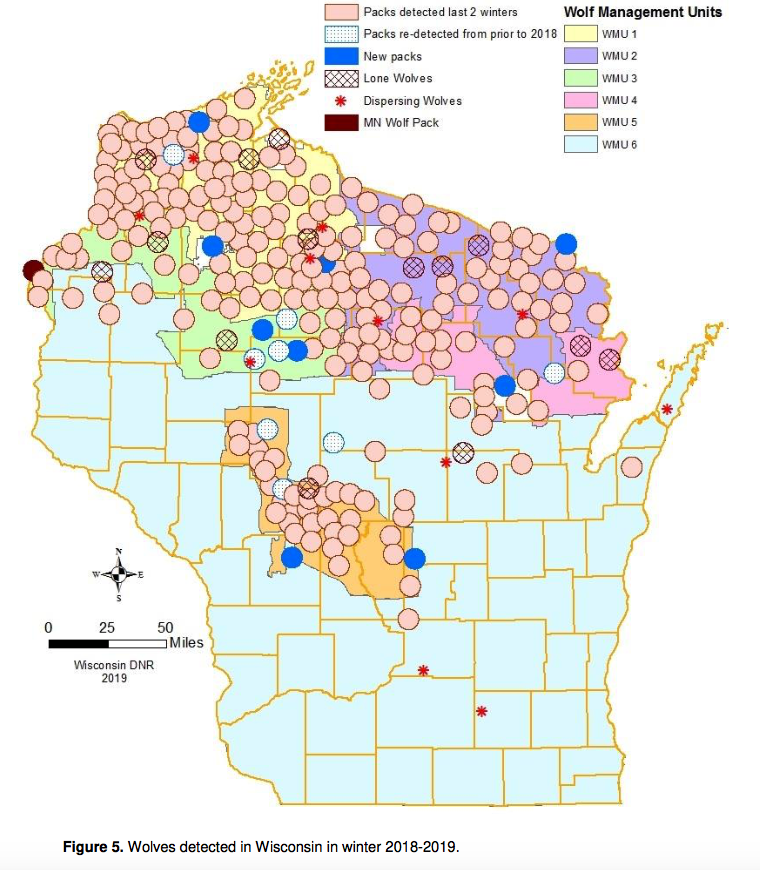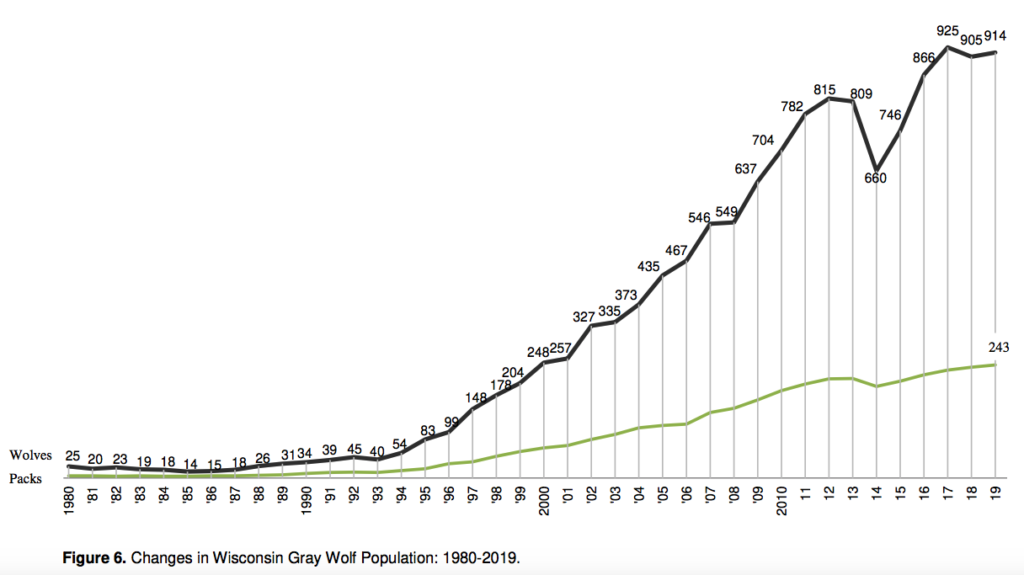By Kevin Naze
As the anticipated federal delisting of gray wolves nears, the coronavirus pandemic is being blamed for delays in the release of Wisconsin’s 2019-20 winter wolf population estimate.
Randy Johnson, the new large-carnivore biologist for the state’s Department of Natural Resources (DNR), said the delisting opens more tools for states to deal with problem wolves.
“Wolves have made a heck of a recovery,” Johnson said. “We in the DNR certainly support state management of gray wolves.”
Johnson said Wisconsin’s data entry for compiling a minimum wolf population estimate was largely completed before COVID-19 caused most DNR employees to work from home, but it’s not out yet.
“It’s close — it’s overdue,” Johnson said in late August. “There’s a lot of moving parts, and it’s been a bit more difficult not being in the office to work together with research staff and communications folks. We’re also incorporating some different methods [for estimating populations] and comparing them side by side.”

Johnson believes the estimate will be made public sometime this month. Michigan recently announced a minimum of 695 wolves among 143 packs across the Upper Peninsula. Minnesota has the most wolves at about 2,700, and Wisconsin’s overwinter minimum estimate last year was 914-978 wolves outside of tribal lands in 243 packs.
U.S. Fish and Wildlife Service (USFWS) Region 3 Director Charlie Wooley said the USFWS has nearly completed its final rule for delisting wolves. Speaking after a press conference in Green Bay recently, Wooley said he expected the interior secretary’s office to give the go-ahead for wolf delisting very soon.
Although a delisting would likely allow lethal control for depredating wolves, it’ll come too late for a return to a wolf hunting and trapping season this year. That’s because not only is it too late in 2020 for a wolf tag drawing, but lawsuits from animal activist groups will follow the delisting announcement.
“We live in a very litigious society,” said Rep. Mike Gallagher (R-Wis.). “But the more clearly we write these, and the more bipartisan support we have for the law, it’ll be harder for people to challenge it in court.”

Wisconsin hunters and trappers tagged 528 wolves in three seasons from 2012 to 2014. The DNR estimated that vehicle collisions, illegal killings, wolves killing other wolves, and disease claimed another 125 or so. Despite more than 600 wolves being killed during that three-year period, the annual minimum population estimate decreased by only 69 animals – from 815 early in 2012 to 746 early in 2015.
For many dog owners, farmers and hunters, delisting can’t come soon enough.
“Farmers especially should be able to take necessary action to protect their livestock,” Gallagher said.
From 1985 through April of this year, the DNR has paid landowners more than $2.7 million for wolf depredation of dogs and livestock, including more than $1.4 million for cattle and just over $1 million for hunting hounds and pet dogs. Fenced deer ($181,000), sheep ($47,465) and horses/donkeys ($39,700) make up the bulk of the rest, with smaller amounts paid for llama, goat, chicken, turkey and pig depredation by wolves.
More than $1.8 million of that 35-year total has been paid out during the past decade. The total will surely rise before year’s end because wolves have attacked at least 33 cattle, 25 dogs, 12 sheep, eight horses and three lambs since May.
In addition, through late August, wolves had killed at least 19 hunting hounds, wounded four more and killed two pet dogs across the counties of Bayfield, Douglas, Forest, Iron, Jackson, Marathon, Marinette, Oneida, Price, Rusk, Washburn and Wood.
In addition, there are more than two dozen suspected but unconfirmed wolf attacks on dogs and livestock, and a number of complaints of wolves showing no fear near residences.
With the black bear season using trailing hounds opening next week, it’s likely that dog deaths will climb, and those running hounds should exercise caution. Conflicts between hunting dogs and wolves are most common during the bear training and hunting season. Dogs have also been depredated while pursuing fox, coyotes, bobcats, rabbits, snowshoe hares and upland birds.
Anyone suspecting a wolf attack in northern Wisconsin should call USDA Wildlife Services immediately at 800.228.1368. In southern Wisconsin, call 800.433.0663.
Although wolf attacks on pet dogs in residential areas are rare, they do occur and have increased in recent years. View the interactive wolf-depredation and threats-mapping application at dnrmaps.wi.gov/H5/?viewer=GRAY_WOLF_DEPREDATION and locations of wolf depredations and threat conflicts at dnr.wisconsin.gov/topic/WildlifeHabitat/wolf/dogdeps.html.
Randy Johnson is stationed at the DNR Service Center in Rhinelander. He was previously the wildlife resource biologist for South Dakota Game, Fish and Parks.
A Minnesota native and avid outdoorsperson, Johnson earned his bachelor’s and master’s degrees in wildlife management from South Dakota State University. His master’s research focused on capturing, collaring and studying mountain lions in the Badlands of western North Dakota.
Source: https://doorcountypulse.com/wild-things-wolf-count-overdue-as-federal-delisting-nears/
